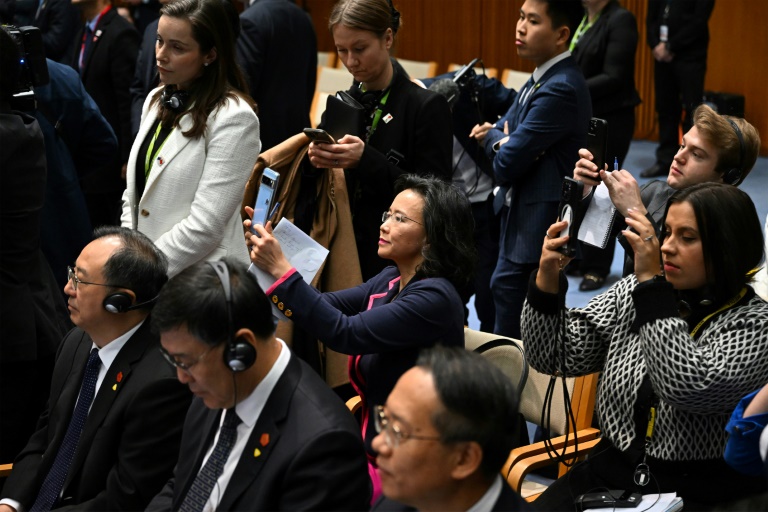Australia expressed concern on Tuesday about the “clumsy” behaviour of two Chinese diplomats at a news conference, tarnishing Premier Li Qiang’s highly publicised visit to celebrate trade and friendship.
Liu, China’s second-most powerful man, posed in front of giant pandas and warmly toasted Australian wine during a rare visit to Australia, stressing the need to resolve “differences” peacefully.
But the meticulously planned tour was briefly thrown into disarray when two Chinese diplomats appeared to tail prominent Australian journalist Chen Lei during a signing ceremony inside the Australian parliament on Monday.
Chen returned to Australia in October last year after being detained in China for three years on opaque espionage charges and has been unflinching in speaking about poor conditions in prison.
Prime Minister Anthony Albanese said on Tuesday that Australia had “contacted the Chinese embassy to express our concerns” and criticised the “clumsy” move.
“If you look at the footage, there was, frankly, a rather clumsy attempt by a couple of people to stand between where the camera was and where Cheng Lei was sitting,” he told state broadcaster ABC.
“And Australian authorities, understandably, stepped in and asked the Chinese officials who were attending the press conference to move on.”
The footage showed two Chinese diplomats sitting next to Cheng repeatedly ignoring requests from upset Australian officials to move.
“They did everything they could to block me from the cameras,” Chen said.
“I think it’s to make sure I don’t say or do anything that might paint me in a bad light,” she told Sky News Australia.
“But that in itself is unsightly.”
In a closed-door meeting just hours earlier, Albanese had told Prime Minister Lee that “foreign interference in Australia’s political system is unacceptable”.
– Lingering “differences” –
The visit by Premier Li Keqiang, the highest-ranking Chinese official to visit Australia since 2017, marks an improving relationship between Beijing and the Australian government after years of trade disputes.
Premier Li concluded his visit with a tour of a China-controlled lithium smelter in Western Australia, a sign of strong Chinese demand for Australia’s critical mineral.
Australia mines 52% of the world’s lithium, most of which is exported in the form of ore to China to be refined and used in batteries.
This is a crucial factor for China’s globally dominant electric vehicle industry.
But despite being a big customer for Australia, China’s involvement in the country’s critical minerals industry is a sensitive issue because of its control over global supply chains.
Prime Minister Li said his visit to Australia showed that “bilateral relations are on the right track of steady improvement and development”.
Despite the displays of friendship, the two countries acknowledge that “differences” remain, signaling a diplomatic standoff in the Pacific.
“We will not always agree, and our differences will not easily disappear if we remain silent,” Mr Albanese said.
Last month, Australia condemned China’s actions as “dangerous and unprofessional” after a Chinese military aircraft allegedly fired flares into the path of a naval helicopter over the Yellow Sea.
Australia said late last year that a Chinese destroyer had beamed dangerous sonar pulses at naval divers.
sft/djw/ssy

